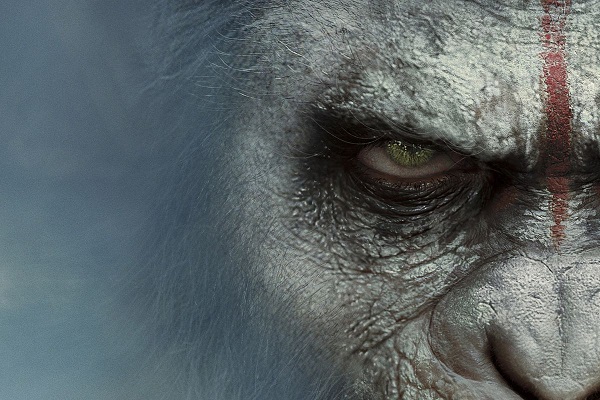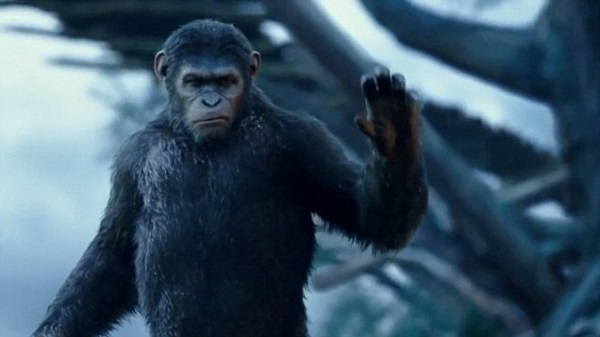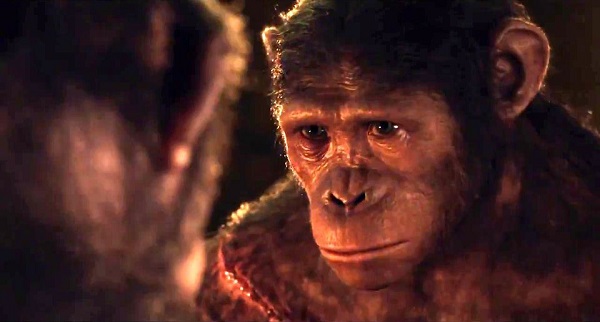Dawn of the Planet of the Apes (d. Matt Reeves USA 2014)
Dawn of the Planet of the Apes (d. Matt Reeves USA 2014)
Please read ‘On Reviews‘ for a guide to how I write film reviews. Any spoilers are appropriately marked and, though I personally prefer to know little about a film before seeing it, there is a synopsis at the bottom for any who wish to see one.
1968 was a rather interesting year for Science Fiction films. The face of the genre changed significantly because of two films. 2001: A Space Odyssey (d. Stanley Kubrick USA/UK 1968) gave some startling realism, new technology and a rather philosophical outlook. Planet of the Apes (d. Franklin J. Schaffner USA 1968) did all these things, but the race of intelligent apes being a competitor for mankind’s rule of earth, was very inspiring. Just like Star Trek (USA 1966-1969) before it, Planet of the Apes inspired many fans and many would dress up as apes for conventions. Planet of the Apes is an iconic Science Fiction film and has given much to cinema with some very famous moments. Like many popular franchises Planet of the Apes has been the subject of a reboot – though twice now. Planet of the Apes (d. Tim Burton USA 2001) and Rise of the Planet of the Apes (d. Rupert Wyatt USA 2011), the former not being successful enough to continue but the latter spawned at least two sequels. Enter Dawn of the Planet of the Apes into the fray.
Something has to be said for the technology of this film. The Motion Capture technology for both Rise of the Planet of the Apes and Dawn of the Planet of the Apes is spectacular. Where the suits in Planet of the Apes (1968) were fairly convincing, they were still very much based upon humanoid biology, the Motion Capture technology has allowed for the Apes to appear as Apes. But not just Apes, the kind of Apes that would conquer the world. The Apes are intelligent emotional and a species of their own. Andy Serkis, being a key figure in Motion Capture technology, gives a stunning performance as Caesar. How is it we can feel so much for a CGI object, is fresh and amazing. Truly a new peace of cinema. All ape characters are especially good in this regard.
For a film such as this you could be forgiven to think that the technical will centred on the CGI effects. It is genuinely refreshing to see the camera being used to great affect. A moment of action with a 360° pan, including action both in the background and the foreground, may sound visually complex, but it works. This is just one example of daring cinematography and successfully adds to the moment. The film is genuinely beautifully shot and with a vibrant narrative, playing successfully on themes established by previous themes – and yet keeping them alive. Seeing characters being swept up by what is going on, keeps the action in the forefront. Morally hard-hitting, a spectator easily follows this film down its rabbit-hole. An easily foreseeable dystopia indeed.
This film isn’t without layers. It is also never without strong characters that guide you through the world and is bold enough to offer a little something at the same time. There will be more Planet of the Apes films and, with luck, they’ll keep to this standard. A lot definitely went to the Motion Capture technology and CGI but this didn’t distract from other important elements of the film. A step in the right direction.
Synopsis
An Ape culture, lead by an ape called Caesar, stumbles across some humans that they thought long extinct. Haunted by past memories of how humanity can be many of the Apes under Caesar are uncomfortable with their presence. They are then placed in a troubling situation when the desperate humans ask them for help despite seeing them as animals.
Further Reading
Take Your Stinking Paws Off Me You Damn Dirty Ape
Where Humans Descend into Slaves
Dawn of the Planet of the Apes Makes a Strong Argument for Humity’s Extinction
Screening Notes Planet of the Apes Analysis
Jay & Silent Bob’s Planet of the Apes












Leave a Reply